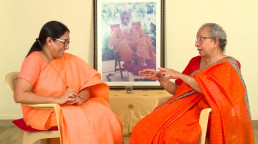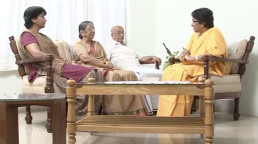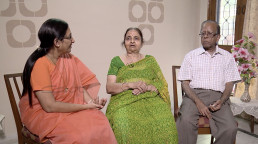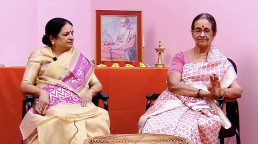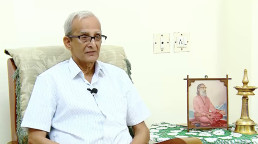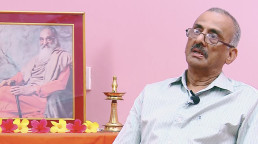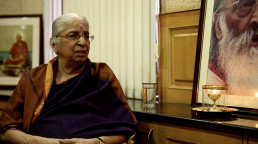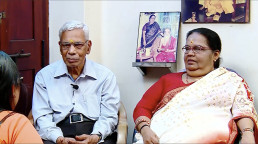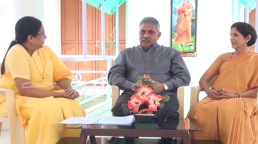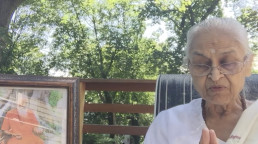Indira Rajaram Interview
Indira Rajaram recalls how Gurudev had sent her sister (late Swamini Pavitrananda) to Kochu Narayani Amma for care.
Transcript of the interview
Swamini Kaivalyananda: I will get someone to transcribe this for you Ganesh!
Vijayalakshmi Amma Interview
Vijayalakshmi Amma shares her memories of her step brother
Transcript of the interview
Vijaylaxmi Amma: He was very affectionate and how can I say… very much attached to the family also. Each and every one of us was very special to him, no difference between his sisters and us. For him, everyone was same. And when we are sick he will take me… I remember him taking me on bicycle to the eye doctor.
Swamini Kaivalyananda: Eye doctor?
Vijaylaxmi Amma: I had some… even then I had some difficulty with my sight and all that. He used to put me on the bicycle and take me to the doctor.
Swamini Kaivalyananda: Those days?
Vijaylaxmi Amma: Those days… I was small. And when we got this chicken-pox, all of us were ill – my father, my sister, my mother… Only Swamiji and father were out of it, so he used to sit on our bed and do everything for us. And my mother will say, “Balan you go away, you will contract it”. “No no Jarima, nothing will happen to me”, he will go on saying, and he will do everything for us. He used to look after us so nicely.
Suman Shroff Interview
Narendra Shroff’s son Ajay Shroff and his wife Suman recollect Balakrishna Menon’s friendship with Narendra.
Transcript of the interview
Suman Shroff: His grandfather was a civil engineer who had studied in London. Then he was working in Vellore for many years, his son (Narendraji’s father) was living there and was studying there only. After that he went with Swamiji to Lucknow college and was studying there, he used to play a lot of tennis with Swamiji. The two often used to come and go to Narendraji’s home in Karol Bagh.
When my father-in-law got sick – he first got typhoid, then started getting high blood pressure, then he got a stroke, a paralytic attack.
Swamini Kaivalyananda: Was he previously having such health issues?
Suman Shroff: No, this was all very sudden – the doctor said he got a stroke and a paralytic attack.
Swamini Kaivalyananda: After his marriage?
Suman Shroff: After his marriage, he got married in 1943. In 1944 his son was born. Then he got a paralytic attack and a haemorrhage, he got a nose haemorrhage once, once there was something in his stomach, there was a lot of blood that was coming out, for three years he was bed-ridden.
Swamini Kaivalyananda (gesturing toward Ajayji): After he was born?
Suman Shroff: Yes. For three years he was bed-ridden, then after a few days Swamiji came there and did a lot of sewa for him. Along with my mother-in-law Swamiji did a lot of sewa for him, my mother-in-law used to say he would change his bed sheets and look after him. Then my father-in-law died, this caused Swamiji a lot of grief. He was his friend, so he was very sad. He took his ashes to Haridwar…
Swamini Kaivalyananda: In which year did your father-in-law pass away?
Suman Shroff: 1947 – 4th August 1947. Swamiji then took Narendraji’s grandfather, mother-in-law and everyone to Haridwar where his ashes were immersed. After that for many days Swamiji did not return to his home. He went to Sivananda ashram, stayed there for a few days, came back to our home and took my mother-in-law with him to Sivananda ashram. There he got her diksha from Swami Sivananda.
Indira and Sarasa Interview
Indira and Sarasa, the granddaughters of Kochu Amma, describe the bond between Gurudev and Kochu Amma (his mother)
Transcript of the interview
Swamini Kaivalyananda: What is that striking quality of Kochu Amma that Gurudev adored?
Indiraji: Not one single quality, I should say. Swamiji used to appreciate each and every aspect of her character. The way she used to command things, the way she used to guide people and she… and she used to be a role-model for everyone, because whoever used to go to her she would have a solution to the problem.
Swamini Kaivalyananda: Could you please tell what type of people Gurudev would send to her to learn things from her?
Sarasamma: Bangalore…
Indiraji: One person from Bangalore he was very rich but there was some problem with his… (incomprehensible words). He said, “you go, you stay with her, you’ll be alright”. And he was from such a very wealthy family but he came, he stayed with us and he was very happy. Then, but there was no problem with that… still, Leela, Pavitra, she’s no more no? She was very lean and thin and all, so Swamiji would say, “You better go and stay with my mother”, “Amma, look after her”. Like that I mean, all of them he used to send her. And then whatever they do, so many devotees always come with Swamiji, so even to them I have heard Swamiji telling that “see, watch her, learn from her”, like that. So one particular aspect I cannot say, that’s why I say, she was an institution all by herself.
Indiraji: He comes with outstretched hands – “Amma, I have come”.
Sarasamma: From the gate only he’ll come like this and he’ll hold Achamma like this and “Amma”, he’ll tell always. Every time Swamiji goes no, she’ll start crying. Every time.
Indiraji: Then I told you no, then after that she will console her… saying no…
Swamini Kaivalyananda: You tell in detail Amma, you tell in detail.
Indiraji: I mean, the moment the letter comes that he is coming, there is festivity in the house. She will start cleaning this that and what not, arranging… otherwise she won’t climb the stairs upstairs – Gurudev’s room was upstairs. Once he has fixed his program of visit she will go upstairs, watch the arrangements, every little bit she’ll watch, do it, very excited that Gurudev is coming. After he leaves she will be full of tears but immediately, it won’t take much time, she’ll console herself… “no, everybody wants… Chinmaya is for everyone”. She had that magnanimity and that outlook.
Sarasamma: After 5 minutes she will be ok but for the time he left…
Indiraji: And that all things that we learnt from her rather, because see, not that very… though she would like to, she was not over possessive, she wants the world wants him. That was her attitude in everything – every little thing – and he too, he’s not that Swamiji who’s roaring in the yagnashalya. He’s like a child, sitting next to her, holding her hand, talking to her and all. And at times, when we all go there he’ll say, “go go, let me sit with my mother”. Like that, just to…
Sarasamma: Achamma will call him Chinmaya only.
Indiraji: It was really like that I told you, everything – when he sits for khaana also, she has to make a big morsel. In Malayalam we say urla, she’ll mix everything, make a big morsel, give it to him, and he’ll take that first only then he’ll start his food, till the last.
Sarasamma: Once when Swamiji was there no, she started eating, she forgot to give the urla to Swamiji. Then after two minutes she sees, “ah, you have not started yet”? “Why, you have not given the urla no, how can I start the khaana?”
Indiraji: And morning immediately after his bath and all, he will come down to her room, downstairs, sit in the bed, talk to her for at least 15-20 minutes, then only start his work, always.
Raveendran Interview
Gurudev’s nephew, Kanakam’s eldest son, Mr. Raveendran shares his memories of Gurudev and Kanakam.
Transcript of the interview
Raveendran: One greatest thing which I found is, when I took her in 1977 or so to Powaii, before she starts entering she started wiping her ears – eyes and nose. As soon as Swamiji met her, saw her, he started teasing her “Why Kanakam? Why you are not crying this time?” And before he could complete the sentence she was crying. At that time I used to wonder why it was so? One day I asked mother, what is the…? And she said to me, “during our younger days it was he who used to control her, give instructions while going to school or coming back, you have to come in time and should not move around like that anywhere without accompany – he will accompany her”
Raveendran: Now, my mother is so emotional and sensitive and he wants her to be more courageous. I don’t know whether it is successful or not when we were – I was always in tension during 92-93 time the news has come…
[in tears..]
Swamini Kaivalyananda: So, you were saying that when the news came that Swamiji was no more….?
Ravindran: Yeah, she was so much upset I myself ran to console her… and she did not even get up for 24 hours from her bed. That is my only memory of this brother-sister relationship.
Balachandran Interview
Mr. Balachandran, Gurudev’s sister Kanakam’s youngest son remembers Sri Kuttan Menon, Gurudev’s father.
Transcript of the interview
Balachandran: See Swamiji’s father was very much devoted to Kanakam’s children. One, she lost her mother… then he had a respect for my father being royal family… See, kind of thing which I remember is, he is a good player if I remember correct because we, I used to, whenever I stay with him, for two things I’ll wait – one, he’ll return from club, Ramavarma Club. He used to bring small balls, what do you call, tennis balls.
Swamini Kaivalyananda: Who, Gurudev’s father? Your grandfather?
Balachandran: Grandfather. Then another memory which I remember is whenever he, because at home we don’t eat bread and all that, but that has not been the culture because we were away from… when I grew up, we were away from what do you call, Trichur which is relatively a better place than Pazainoor, where my father had a sort of familial palace outhouse for living which is as good as old style construction and all that. There is a temple nearby… Pazainoor temple and all that, so whenever we come to Trichur one thing which I remember is that he has a – either in the evening or the morning I don’t remember – but he used to take bread with milk. So that was a, what do you call, like ice cream these days a great thing which you look forward to. So he used to give to the children first, whoever is around, and eventually he will, no… he will miss it out.
Ramchandran: Yes, yes, this glass, very big glass is there. In that one bread you know, he used to cut and put it. It will be soaked, then it will be given to us, I remember.
Balachandran: Another thing you know is see, since he doesn’t take otherwise… Cherriammu Amma was very particular to see that we are not anywhere near, because you know, otherwise he will give it to grandchildren, because there is no other grandchildren.
Swamini Kaivalyananda: Cherriammu Amma here is who?
Balachandran: Cherriammu Amma means second… Devaki Amma, because he is concerned about his health he must have come from, maybe it is in the evening after a hard play and all that so that may be the reason.
Swamini Kaivalyananda: So he would play tennis is it?
Balachandran: Or cards, I don’t know. But he used to invariably bring a… tennis ball. So I asked for it and he’ll bring it. We’ll stay here a week or ten days or like that only. So during these days he keeps us also a… (incomprehensible word). So this is I think, some of the, some of the memories about him.
Kamala Amma Interview
Kamala Amma shares her experiences with Gurudev
Transcript of the interview
Kamala Amma: Once we were on our way to Haridwar-Rishikesh – my family in the sense my uncle, aunt, and my mother and… we were four or five of us. And at that time he was staying in that 16 park area, one Mr. Shroff yeah… Mr. Shroff’s house. And there we had gone to meet him and he was talking for awhile. That time he was mentioning about how he…. uh… that about friendship and the family friendship and the son of theirs who was his classmate or something, I don’t know how he was associated. And he was very young – couple with a child and he was very ill, and sort of terminally ill.
So he wanted to go to Rishikesh to meet Sivananda, because after his jail term and suffering and his cousin who was in the forestry department, where he had gone for convalescence and there he happened to read Sivananda’s My magazine. Divine Life Society was bringing out My magazine and that he happened to be reading to spend his time and he found… see, he was very doubtful about all that is being talked about in the Hindu religion, practices, beliefs and everything. And so when he was going through those magazines he got some of his answers for doubts, doubts for some of his answers to be more precise.
Then he became a little curious, I must meet this man Sivananda and also see what these people are doing in the garb of sanyasis over there. So he wanted to go there and when he was stopping at this Shroff’s house he was sick, very sick – this Swamiji told me, told us rather… our family. Then he… at that time this friend of his said don’t be too long, come back soon, so he had gone and spent some time with meeting Sivananda and all that. And also he looked at all the so called sanyasis there and had come back, and when he came back within the next day or so this very friend of his died on his lap.
Swamini Kaivalyananda: On Gurudev’s lap?
Kamala Amma: Yes, that’s what he told us. That sort of gave a sort of a transformation so to say no. So then after that was over he went back to Sivananda, he wanted to go meet, and spend some time – more time, try to understand and all that.
Jaya Menon Interview
Jaya Menon daughter of Gurudev's youngest sister Padmini
Talks about Gurudev's affection for his sister
Swamini Kaivalyananda Gurudev lost his mother when he was very small – like 5 years or something like that. And both the sisters – one sister was brought up by another Ammoomma of yours, and your mother and Gurudev were brought up by Kochu Narayani Amma. So, has your mother shared any of the most caring moments that Gurudev had with her?
Jaya Menon My mother was almost blind. As a result, she could not go to school and studied only till grade 4. She could see very little, mostly shadows of everything. My mother if she would even venture out, for getting jackfruit leaves (primarily used as spoon for kanji) which could be used for the day to day affair of the house would get scolded by Swamiji as he was concerned that she would not be able to spot snakes which could coil up near such trees. He used to love her that much. “You don’t go. Just tell me or there are other people in the house who could help you do this”.
Gurudev's sends his sister, recordings of his Yagnas
Swamini Kaivalyananda After he became sanyasin, what type of relationship did your mother and Gurudev share?
Jaya Menon Since mom could not see, she would go to the front of the house and in the sunlight try to look closely at the Tapovan Prasad, so that she could at least have a glimpse of her brother. “I can’t see anything, my daughter, I can’t see anything. Just can see a shadow”, my mother would say. I used to really feel sad those times as I could really see the love of a sister for her brother and her pining to see her beloved brother.
So I decided to write to Swamiji, since I had heard that video cassettes of his talks had been released, to request him to send a video cassette which could be played on a television, in which at least he could be seen better, bigger and clearer. He communicated back that he had called up Bangalore and that they will send you the cassettes. First he sent around 35 audio cassettes (Geeta Chanting, Geeta speeches, Bhajans) .
So again I wrote back to him saying that I required only 1 video cassette so that I can put it for my mother. He said that “They will send it. I have told them. They will send it immediately”, Swamiji said. First they sent 6 video cassettes, and then they sent 5 more. They stuffed audio cassettes between these video cassettes. There was a bill attached and I picked it up to read as to how much was the amount to be paid. It said “Paid” with 2 lines on top of it. Maybe he instructed them to pay it and “Paid” was written on it. He loved his sister so much that when I asked for one single video cassette, he sent 11 of them.
Appa Rao & Sumati Rao Interview
Transcript of the interview
Dr. AppaRao and his wife Dr. Sumathi AppaRao served Pujya Gurudev for many years and hosted him whenever he visited Michigan. They played a major role in his health care. Dr. AppaRao has served Chinmaya Mission West (CMW) in many capacities. He is also a member of the board of trustees of the Chinmaya International Foundation, Chinmaya Vishwavidyapeeth and CORD (Chinmaya Organization for Rural Development). The devoted couple have set up Chinmaya Vijaya, a beautiful and idyllic home for needy girls in Vijayawada. In this interview, they share many of their experiences during their close interaction with Pujya Gurudev through the years.
11:23 onwards
Swamini Kaivalyananda: By then his first bypass, he stayed with you for how many weeks uncle, 6 weeks?
Dr. AppaRao: More than 6 weeks.
Swamini Kaivalyananda: More than 6 weeks right, so… personally treating Gurudev as doctors, you have to share those experiences uncle.
Dr. AppaRao: It was tough, condition was tough. It was June-July of 1980 and the decision was made that Swamiji needs heart surgery. By then he had had a heart attack 10 years before that, and the heart was pumping only at 80% capacity. Means one is not functioning at that lower level but Swamiji was giving discourses actively and to submit him to surgery was a definite risk of not coming out of it successfully, but that’s selfish. And basically Swamiji made the decision himself, it’s not we that said that. We laid down the facts with Gurudev.
I told him “Swamiji, you have a problem with the heart, and the heart valve was blocked up and we need to do a by-pass and there’s a very very good chance of coming out successfully but any surgery of this sort is risky”. He thought it would be, he said “yes, yes”. He says “how long does it take”? “Swamiji if you say yes we’ll consult the surgeon, we’ll (incomprehensible word) and later a few days in the hospital, a week or so”. “And how long? When can I get back to work?” I lied, I said “maybe couple of weeks”. I knew in my own heart its going to be couple of months, not couple of weeks. He said, “what will it cost?” I said, “not much”.
Next day morning having breakfast he said “yes, lets plan”. Swamiji was staying in the basement because he could not walk up the stairs we had to walk out the basement where the car will come to the back. Then where my radiology library was, the night before Swamiji went through the angiogram books and figured out the anatomy of the blood vessels and the heart. He said “you have to show me where the blocks are”. I showed him this, this and this. “What does it do”? I said “they take the vein from the leg and they pass it back and all that”. Then he understood what exactly they do. Then I said “Swamiji we may need to send out a letter to all the devotees”. He said yes. He dictated the letter under my signature. He said “don’t mail it till after the surgery is over”.
So it was in Houston, and Dr. Cooley came and met Swamiji. It was on a Saturday. He said, “Swami, what is a good day per Hindu calendar to have surgery”. He said “Cooley, any day is a good day as long as Cooley is operating on me”. He was kind of awestruck when he said that, “how about Monday”? I said, “Cooley, any day is a good day. I’m also ready tomorrow, let’s do it right now”. But remember what I said, “as long as Cooley on him, not your sisters not your fellows”. He said, “yes Swami I understand”.
Swamini Kaivalyananda: He alone.
Dr. AppaRao: So I was told it was the first time after a long time that Cooley did the surgery completely on his own from skin to skin. Normally he does the most crucial part of the surgery where you by-pass the vessel, but in Swamiji’s case he did the whole thing from incision to the close up. As many of you have seen Swamiji’s heart, where… with the Polaroid camera that time was very popular, that Cooley himself took a Polaroid photograph of the heart, of the by-pass graft that he made of Swamiji’s heart and gave it to us as a souvenir. And that we distributed to all the people that donated the money for the heart.
It was a successful surgery and Swamiji was discharged within a week or ten days. This was in Houston. You know how active Chinmaya Mission is in Houston right now, but at the time we had trouble finding a family that will give Swamiji a decent vegetarian meal. So we had to go 60 miles out of Houston to one of the devotee’s homes who happens to be related to senior devotees of Chinmaya Mission in India. It was Dwarkanath Reddy’s family, their family was not too far from Houston so they used to bring some food. Before that there was no family that could cater to our needs.
Swamini Kaivalyananda: 60 miles just to get the food?
Dr. AppaRao: To get the vegetarian food for Swamiji when he was in Houston. Now..
Dr. Sumathi: The first year after the surgery, because nobody was there to give him any Indian vegetarian food so we gave hospital… the clear soup they start with. So he had just… my brother was there and helping him that day, so he had one tiny spoon, put it in his mouth and he just spit it so fast and he said – what was that – he said…
Dr. AppaRao: He said, “this smells like chicken broth”.
Dr. Sumathi: Chicken broth.
Dr. AppaRao: Vegetarian soup with chicken broth. There vegetarian soup also has some base.
Swamini Kaivalyananda: After that like how long was he in hospital?
Dr. AppaRao: He was in hospital for a week or ten days, then he came to Michigan and he recuperated there for two three weeks in one of the resorts in Upper Michigan. Then he came home and spent a few weeks at home. One of the things the doctor recommended was he should be walking, a part of cardiac rehab after surgery. So I used to go to work, come home by 4-5 o clock and we used to go. One day I came and…
Dr. Sumathi: From work… he used to come from work and ask…
Dr. AppaRao: Around 4:30-5 o clock “Swamiji let’s go for a walk”. “Oh, I finished my walk today” he said. I said “wow, how long did Swamiji walk?” “4-5 miles”. Then I asked my wife, “did you guys go out already?” She said no. I said, “I don’t think Swamiji went for a walk”. He said “I told you I went, I walked mentally today 5 miles. No physical walk”. He said “I finished my walk today, no more”. And again in 91 May when he was in (incomprehensible words) and that was the time we made plans to professionally video-tape the Bhagavad Gita, this was a marathon camp in Piercy, California. At that time Swamiji was in heart failure, we took him to Dr. Chatterjee in San Francisco. By then we knew that heart is not functioning very well and Dr. Chatterjee said that Swamiji is not the candidate for surgery. At the time the decision was to submit him to a second surgery to bypass the blocks. The gaps are just to manage him without surgery just with medications. Dr. Chatterjee one of the authorities in heart failure said that he’s not the candidate for surgery and we will manage him medically. And slowly deteriorated health from 91 to 93 and 93 again he had a cardiac arrest. We did try desperately to do a second bypass surgery after the heart stopped beating, again it was not successful.
Swamini Kaivalyananda: Gurudev – did you ever feel he was a superhuman?
Dr. AppaRao: Yeah absolutely, no question. Swamiji was undergoing bypass in one operation theatre in San Francis… in La Jolla, near San Diego and operating rooms were there, 7-8 of them… in the next room was an orthopaedic surgeon, an American doctor was operating and he came to this room, I was watching the surgery obviously. He said, “I feel some vibrations in the operating room, something is going on, some great Mahatma is here… and we showed him…
Swamini Kaivalyananda: He’s a Westerner?
Dr. AppaRao: Westerner, he said I can feel him in my room.
Dr. Sumathi: The next operating room he was operating on somebody else, he doesn’t even know what’s going on – Gurudev in the next room. So he just felt some vibrations it seems something…
Dr. AppaRao: Unusual, unusual and pleasant and out-of-body experience was going on…
Dr. Sumathi: So he asked the nurses “what’s going on around? I feel some vibrations here, something different than usual”. They said, “we don’t know but some Swami is getting surgery next room”.
Dr. AppaRao: And that was July 27th or 28th… and the, to have been part of Swamiji’s healthcare was a blessing and a great experience.
Shailaja Nadkarni Interview
Acharya Shailaja Nadkarni describes the night at the Intensive Care Unit
Dr. Shailaja Nadkarni, a paediatric cardiologist from Orlando, met Pujya Gurudev in the early 1980s. Her vision of Pujya Gurudev and the story of her spiritual growth are delineated beautifully in this interview. As the acharya of Chinmaya Mission Orlando, she has touched the hearts of hundreds of people who have interacted with her. This interview was conducted in August 2017 in Orlando, U.S.A., by Acharya Vilasini Balakrishnan, who had also spent considerable time with Pujya Gurudev and continues to serve Chinmaya Mission West whole-heartedly.
There were two incidents. In San Diego, when I reached there, heard Gurudev was hospitalised, I told my husband I have to go and have his darshan. So I went. Many devotees were sitting in the waiting room. Guruji also came. We were all sitting with a heavy heart. Gurudev was in the intensive care unit. And I had a chance to have a darshan of him. Some of us devotees came and sat back again. That night it was decided that he is supposed to be transferred to the other hospital – Sharp hospital for further treatment. We were all talking about that. In the morning he was supposed to be taken there in an ambulance. When we were standing chanting Om Tryambakam in the corridor where the stretcher was going to come through so that we could have his last darshan while transferring him, both sides devotees were chanting. I remember a young American girl was standing next to me. She asked me, “Who is this? Is he a saint or something?” I said, “He is a great saint from India and he is being transferred from here.” She said, “You know, my mother is American, but she was right in front of him in the ICU. And she said that she went to the East, in Asia and she learnt Eastern mysticism. She is a mystic and she said that last night my mother was very ill, but before we brought her to the hospital, she told me that a great saint is going to release her from this bodily covering. And that night Gurudev was there in the ICU. Although there were little compartments, her bed was right in front of him. That night she passed away. She said he has to be the one.” So that last work also Gurudev did for that devotee.
Then he went to Sharp Hospital. We were all chanting in the waiting room, heavy-hearted, we couldn’t even talk. We somehow had some little dinner here and there and our hearts were just totally totally totally pulled down and in the meanwhile the spirits were getting pulled down. It was an experience of a lifetime.
That night somehow I got to sleep in the waiting room. Everybody had gone and I was told that I need to go and I said I will go in a little while. I sneaked out and that night about 3:30 or quarter to four, the bell rang. At that time, the phones were mounted on the walls. We did not have mobiles or cell phones. In the waiting room, I was physically tired, mentally exhausted, and so many phone calls were coming. I got the phone and said, “Hello,” and from the other side, the voice came, “This is Swami Chidananda “. I suddenly realized this was the swami I saw in Tirunelveli. He asked, “How is Swami Chinmayananda?” I told him immediately, “Swamiji, he is very critical.” He said, “Guru is never critical. Do not use that word.” That when I heard from Swami Chidananda’s mouth, it felt as if a heavy stone was lifted from my heart. My heart became like a butterfly and started dancing all around. When I realized that Gurudev is not critical, he is beyond body consciousness! What am I thinking about? Swami Chidananda said one more line, “Whoever had a glimpse of Swami Chinmayananda, had total Ishwar Darshan in their lives.” And then, at the end, he told me, “Take off your shoes and go to the third floor and bask in the presence of Brahman.” I just cannot explain what that meant to me at that time. He said, “I am coming at 10:30 to visit Swami Chinmayananda. I will be there in San Diego. Hari Om!”
After I hung up, I went to the third floor, intensive care. Gurudev was there with a male nurse. I entered the room and the nurse asked me, “Who is this person?” I said, “He is a great saint from India. Why are you asking?” He said, “We nurses, all want to take care of him. Sometimes there is an argument between us. I got this privilege tonight because this room is wafting with fragrance. Most of the patients are different in intensive care. This is a very special patient. I had this blessing.” I stood in stunned silence there with all these experiences. Gurudev looked like a Bhishma Pitamaha with all the tubes coming out of him. I realized this body is not Gurudev. I realized he is Brahman. I am under the sunshine of Brahman, feeling that warmth and glow and light, basking in it and I just felt in that silent moment tremendous moment of my life. That is the highest point of my life. And then I came down and I shared with some devotees who started trickling in. Everybody was chanting Om Namashivaya, Tryambaka japa, Mrityunjaya mantra. I had to leave early. Chidananda Swami came. There were some other experiences. Basically I want to share this experience – for all of us, not only for me, who are Gurudev’s disciples and devotees, Gurudev’s followers, who had Gurudev’s glimpses or heard his name even once, they all had total Ishwar Darshan. Not only were we basking in the presence of Brahman at that time, but we are basking in the presence of Brahman now. And I feel that continuously. He is holding my hand and guiding me through. He knows my heart, guides me through. He is my Guru. And I will say in the end that all of us are one as devotees and as one spirit we have spoken with God, we have lived with God, and we have been with God. So we can never say, “I never saw God.” Hari Om Tatsat. Jai Gurudev. Jai Jagadeeshwara.
The above snippet is from the original interview, which can be watched here in full.
